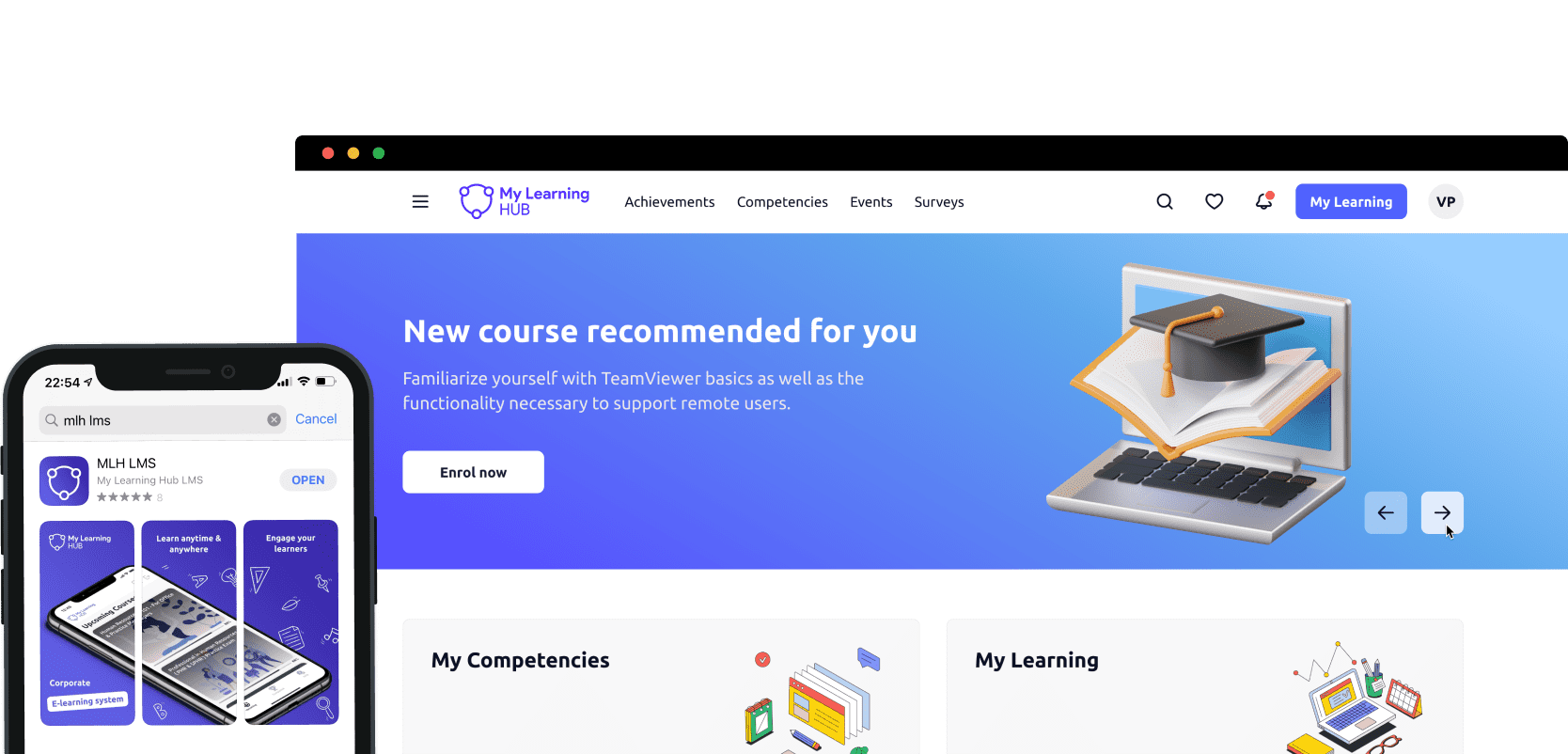
Regarding workplace training, there are many different options businesses can choose from. One of the most popular choices is utilising a learning management system (LMS).
An LMS can be used for everything, from onboarding new employees to providing professional development courses.
In this blog post, we will discuss what an LMS is, what it can do, and some of the benefits of using one in a corporate setting. Let's get started!
What is a Corporate LMS?
A learning management system (LMS) is a software application that enables the creation, delivery, and management of educational or training content.
Corporate LMS solutions are designed specifically for businesses and organisations and offer several features and benefits that are not found in other types of LMS platforms. For example, corporate LMS solutions often include built-in tools for online courses, learning portals, and performance tracking.
Additionally, many corporate LMS solutions are compatible with other business applications, such as CRM and HR systems. It allows businesses to integrate their learning management system seamlessly with their other operations. As a result, a corporate LMS can help improve employee productivity and efficiency while reducing costs.
What Tasks a Corporate LMS Can Do?
A corporate LMS can do several tasks that are crucial to the success of businesses.
A corporate LMS can be used to deliver training content, track employee progress, and measure results.
It can also be used to onboard new employees and keep current employees up-to-date on company policies and procedures.
A corporate LMS is an essential tool for businesses that want to keep track of employee progress and compliance.
By tracking employee activity and results, businesses can identify areas where employees need improvement and design targeted training programmes to address those needs.
In addition, by maintaining a record of employee progress and compliance, businesses can ensure that employees meet all the requirements of their job roles.
A corporate LMS can also be used to create and administer online exams and assessments. It can be a valuable tool for businesses that want to measure employee knowledge or test new employees on company policies and procedures.
Additionally, by administering exams and assessments online, businesses can save time and money on paper costs and printing fees.
A corporate LMS can also provide valuable business analytics and insights into employee performance. This data can be used to improve employee productivity, identify training and development needs, and track the success of training programs.
Benefits of a Corporate LMS
A corporate LMS can also be used to deploy e-learning content and to create custom training programmes. There are many benefits of using a corporate LMS, including:
- Increased Efficiency: A corporate LMS helps to streamline the employee learning experience. It enables employees to access training content from any device, at any time. Additionally, a corporate LMS provides managers with real-time data on employee learning progress and performance. This information can be used to improve the efficiency of employee training and development programmes.
- Enhanced Engagement: A corporate LMS can help to increase employee engagement in training and development activities. By providing employees with personalised learning experiences, a corporate LMS can help employees feel more motivated to complete their training goals. Additionally, a corporate LMS can give social and gamification features that can further increase employee engagement.
- Improved Performance: A corporate LMS can help to improve employee performance by providing access to high-quality training content. Additionally, a corporate LMS can provide employees with the ability to track their learning progress and receive feedback on their performance. This information can identify areas where employees need additional support or development.
- Reduced Costs: A corporate LMS can help to reduce the costs associated with employee training and development. A corporate LMS eliminates the need for travelling and accommodation expenses by delivering training content online. Additionally, a corporate LMS can help to reduce the costs of purchasing and storing printed training materials.
- Increased Scalability: A corporate LMS is scalable and flexible, making it ideal for companies of all sizes. As a company needs change, a corporate LMS can be easily modified to accommodate new users, new content, or new functionality. Additionally, a corporate LMS can be deployed across multiple locations, making it possible to provide employees with consistent training experiences regardless of location.
- Comprehensive Reporting: A corporate LMS provides extensive reporting features that give managers visibility into employee learning progress and performance. This information can be used to assess the effectiveness of employee training programmes and make necessary adjustments. Additionally, this data can be used to generate compliance reports or for auditing purposes.
- Enhanced Security: A corporate LMS includes security features that help to protect sensitive training data from unauthorised access or misuse. These features include user authentication mechanisms, data encryption, and activity logging. By deploying a corporate LMS, companies can ensure that their employee training data is safe and secure.
Choosing a Corporate LMS
When choosing a corporate LMS, you must consider your company's and your employees’ needs. There are a variety of corporate LMS solutions available, so it is necessary to select a system that is right for your company. To help you choose the best corporate LMS for your needs, consider the following factors:
- Training Content: The first step in choosing a corporate LMS is assessing the training content you need to deliver to your employees. If you already have existing training content, you must determine if the corporate LMS can accommodate this content. If you do not have existing training content, you will need to determine if the corporate LMS includes authoring tools that will allow you to create your content.
- Employee Learning Styles: It is essential to consider the learning styles of your employees when choosing a corporate LMS. Some employees may prefer to learn through video content, while others may like interactive exercises or games. Additionally, some employees may require more structure and guidance, while others may prefer to explore training content at their own pace. By considering the learning styles of your employees, you can ensure that they can effectively engage with the training content.
- Compatibility: You must determine if the corporate LMS is compatible with your company's existing systems and infrastructure. It includes compatibility with Operating Systems (OS), web browsers, mobile devices, and authoring tools. Additionally, you will need to consider if the corporate LMS can integrate with your company's HRIS or ERP system.
- Pricing: The price of a corporate LMS can vary depending on the features and functionality included in the system. Some corporate LMS providers offer subscription-based pricing models, while others charge a one-time fee. When considering pricing, it is essential to determine if the cost of the system is justified by the benefits it will provide to your company.
- Implementation and Support: You will need to consider the corporate LMS implementation process and the support available from the provider.
Some providers offer turnkey solutions that include everything needed for successful deployment, while others require you to implement the system yourself. Some providers offer 24/7 support, while others only provide support during business hours.
Considering the implementation and support options, you can ensure that the corporate LMS is successfully deployed and that you have access to the resources you need if any problems arise.
Keeping these factors in mind, you can choose a good-suited corporate LMS for your company's needs.
Verdict!
The takeaway is that there are many factors to consider when choosing a corporate LMS. But, with the right system, your employees can learn and develop new skills quickly and easily. What are some critical factors you'll keep in mind when deciding?
Do you need an absolute solution for all your corporate training needs? Don't worry; we are happy to assist you. Feel free to book a free demo with My Learning Hub here!














